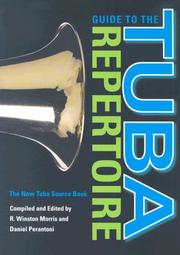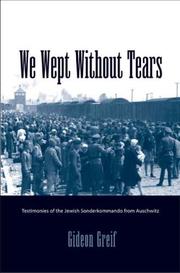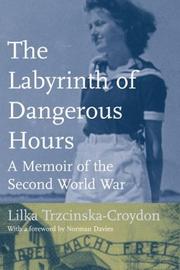| Listing 1 - 10 of 28 | << page >> |
Sort by
|

ISBN: 0253112257 9780253112255 0253347637 9780253347633 Year: 2006 Publisher: Bloomington, IN Indiana University Press
Abstract | Keywords | Export | Availability | Bookmark
 Loading...
Loading...Choose an application
- Reference Manager
- EndNote
- RefWorks (Direct export to RefWorks)
Guide to the Tuba Repertoire is the most comprehensive investigation ever undertaken into the literature and discography of any single musical instrument. Under the direction of R. Winston Morris and Daniel Perantoni, this publication represents more than 40 years of research by dozens of leading professionals throughout the world. The guide defines the current status of the tuba and documents its growth since its inception in 1835.Contributors are Ron Davis, Jeffrey Funderburk, David Graves, Sk
Music --- Tubists --- Tuba music --- Tuba --- Composers --- Musicians --- Tuba players --- Brass instrument players --- Recorded accompaniments (Tuba) --- Bass horn --- Bass tuba --- BB♭ tuba --- Bʹ♭ tuba --- Bombardon --- Cʹ tuba --- CC tuba --- Contrabass tuba --- Double B-flat tuba --- Double Cʹ tuba --- Brass instruments --- Helicon
Book
ISBN: 9780191749452 9780191649158 0191649155 0191749451 0199670072 9780199670079 Year: 2014 Publisher: Oxfrod, United Kingdom
Abstract | Keywords | Export | Availability | Bookmark
 Loading...
Loading...Choose an application
- Reference Manager
- EndNote
- RefWorks (Direct export to RefWorks)
Caribbean Integration Law offers an in depth legal analysis of the two main regional organizations in the Caribbean, the Caribbean Community (CARICOM), and the Organisation of Eastern Caribbean States (OECS). It examines the Revised Treaty of Chaguaramas (RTC), the Revised Treaty of Basseterre (RTB) and their respective trade regimes, the CARICOM Single Market and Economy and the OECS Economic Union. It subjects both treaties to sustained, holistic and comparative legal analysis, including analysis of related developments in international institutional law, EU law, and WTO law.
Law --- Public law --- Regionalism --- Caribbean Community. --- O.E.C.S. (Organization) --- Human geography --- Nationalism --- Interregionalism --- Acts, Legislative --- Enactments, Legislative --- Laws (Statutes) --- Legislative acts --- Legislative enactments --- Jurisprudence --- Legislation --- OECS --- Organisation of Eastern Caribbean States --- Organization of Eastern Caribbean States --- C.A.R.I.C.O.M. (Caribbean Community) --- CC (Caribbean Community) --- C.C. (Caribbean Community) --- CARICOM (Caribbean Community) --- Caribbean Free Trade Association
Book
ISBN: 9766376549 9789766376543 9766376220 9789766376222 Year: 2013 Publisher: Kingston Miami Ian Randle Publishers
Abstract | Keywords | Export | Availability | Bookmark
 Loading...
Loading...Choose an application
- Reference Manager
- EndNote
- RefWorks (Direct export to RefWorks)
Regionalism --- Sovereignty. --- Sovereignty --- State sovereignty (International relations) --- International law --- Political science --- Common heritage of mankind (International law) --- International relations --- Self-determination, National --- Human geography --- Nationalism --- Interregionalism --- Law and legislation --- Caribbean Community. --- Caribbean Free Trade Association --- C.A.R.I.C.O.M. (Caribbean Community) --- CC (Caribbean Community) --- C.C. (Caribbean Community) --- CARICOM (Caribbean Community) --- Caribbean Area --- Politics and government
Book
ISBN: 3838271068 9783838271064 3838211065 9783838211060 Year: 2018 Publisher: Stuttgart
Abstract | Keywords | Export | Availability | Bookmark
 Loading...
Loading...Choose an application
- Reference Manager
- EndNote
- RefWorks (Direct export to RefWorks)
Auschwitz (Concentration camp) --- KL Auschwitz --- Oświęcim (Concentration camp) --- Konzentrationslager Auschwitz --- Oshṿits (Concentration camp) --- Aušvic (Concentration camp) --- KZ Auschwitz --- Auschwitz I (Concentration camp) --- Concentration camp "Auschwitz" --- CC Auschwitz --- אוישוויץ --- אושוויץ --- אושוויץ (מחנה-ריכוז) --- מחנה אושווינצ׳ים --- Osvent︠s︡im (Concentration camp) --- Aushvit︠s︡ (Concentration camp) --- Освенцим (Concentration camp) --- Aousvits (Concentration camp) --- Аушвіц (Concentration camp)
Book
ISBN: 3110598213 3110593750 9783110598216 9783110593754 Year: 2019 Publisher: München Wien
Abstract | Keywords | Export | Availability | Bookmark
 Loading...
Loading...Choose an application
- Reference Manager
- EndNote
- RefWorks (Direct export to RefWorks)
This is the first attempt to explain how Jewish doctors survived extreme adversity in Auschwitz where death could occur at any moment. The ordinary Jewish slave labourer survived an average of fifteen weeks. Ross Halpin discovers that Jewish doctors survived an average of twenty months, many under the same horrendous conditions as ordinary prisoners. Despite their status as privileged prisoners Jewish doctors starved, froze, were beaten to death and executed. Many Holocaust survivors attest that luck, God and miracles were their saviors. The author suggests that surviving Auschwitz was far more complex. Interweaving the stories of Jewish doctors before and during the Holocaust Halpin develops a model that explains the anatomy of survival. According to his model the genesis of survival of extreme adversity is the will to live which must be accompanied by the necessities of life, specific personal traits and defence mechanisms. For survival all four must co-exist.
Auschwitz. --- jüdische Ärzte. --- Überleben. --- HISTORY / Holocaust. --- Auschwitz (Concentration camp) --- KL Auschwitz --- Oświęcim (Concentration camp) --- Konzentrationslager Auschwitz --- Oshṿits (Concentration camp) --- Aušvic (Concentration camp) --- KZ Auschwitz --- Auschwitz I (Concentration camp) --- Concentration camp "Auschwitz" --- CC Auschwitz --- אוישוויץ --- אושוויץ --- אושוויץ (מחנה-ריכוז) --- מחנה אושווינצ׳ים --- Osvent︠s︡im (Concentration camp) --- Aushvit︠s︡ (Concentration camp) --- Освенцим (Concentration camp) --- Aousvits (Concentration camp) --- Аушвіц (Concentration camp)
Book
ISBN: 1442624337 9781442624337 9781442650664 1442650664 1442624345 Year: 2015 Publisher: Toronto
Abstract | Keywords | Export | Availability | Bookmark
 Loading...
Loading...Choose an application
- Reference Manager
- EndNote
- RefWorks (Direct export to RefWorks)
On the Defensive considers how our ethical responses to the Nazi camps have unintentionally repressed and denied the experiences of their victims.
World War, 1939-1945 --- Ethics in literature. --- Witnesses in literature. --- World War, 1939-1945, in literature --- Literature and the war. --- Delbo, Charlotte --- Semprún, Jorge --- Semprun, Ḥorheh --- Semprún y Maura, Jorge --- Maura, Jorge Semprún y --- Semproun, Chorche --- סמפרון, חורחה --- Semprún Maura, Jorge --- Sánchez, Federico, --- Criticism and interpretation. --- Auschwitz (Concentration camp) --- Buchenwald (Concentration camp) --- Concentration Camp Buchenwald --- CC Buchenwald --- KL Buchenwald --- Konzentrationslager Buchenwald --- KZ Buchenwald --- Sowjetisches Speziallager Nr. 2 --- KL Auschwitz --- Oświęcim (Concentration camp) --- Konzentrationslager Auschwitz --- Oshṿits (Concentration camp) --- Aušvic (Concentration camp) --- KZ Auschwitz --- Auschwitz I (Concentration camp) --- Concentration camp "Auschwitz" --- CC Auschwitz --- אוישוויץ --- אושוויץ --- אושוויץ (מחנה-ריכוז) --- מחנה אושווינצ׳ים --- Osvent︠s︡im (Concentration camp) --- Aushvit︠s︡ (Concentration camp) --- In literature. --- Освенцим (Concentration camp) --- Aousvits (Concentration camp) --- Аушвіц (Concentration camp) --- דלבו, שרלוט
Book
ISBN: 9766376301 9766377456 9789766377458 Year: 2013 Publisher: Kingston Miami
Abstract | Keywords | Export | Availability | Bookmark
 Loading...
Loading...Choose an application
- Reference Manager
- EndNote
- RefWorks (Direct export to RefWorks)
Regionalism --- Free trade --- Caribbean Community. --- Caribbean Area --- Caribbean, English-speaking --- Economic integration. --- Economic conditions. --- Economic policy. --- Political aspects. --- Social aspects. --- Politics and government. --- E-books --- Free trade and protection --- Trade, Free --- Trade liberalization --- International trade --- Human geography --- Nationalism --- Interregionalism --- C.A.R.I.C.O.M. (Caribbean Community) --- CC (Caribbean Community) --- C.C. (Caribbean Community) --- CARICOM (Caribbean Community) --- Caribbean Free Trade Association --- Anglophone Caribbean --- Caribbean, Anglophone --- English-speaking Caribbean --- Caribbean Free Trade Association countries --- Caribbean Region --- Caribbean Sea Region --- West Indies Region

ISBN: 1281722804 9786611722807 0300131984 9780300131987 0300106513 9780300106510 9780300211979 030021197X 9781281722805 6611722807 Year: 2005 Publisher: New Haven, Conn. London Yale University Press
Abstract | Keywords | Export | Availability | Bookmark
 Loading...
Loading...Choose an application
- Reference Manager
- EndNote
- RefWorks (Direct export to RefWorks)
The Sonderkommando of Auschwitz-Birkenau consisted primarily of Jewish prisoners forced by the Germans to facilitate the mass extermination. Though never involved in the killing itself, they were compelled to be "members of staff" of the Nazi death-factory. This book, translated for the first time into English from its original Hebrew, consists of interviews with the very few surviving men who witnessed at first hand the unparalleled horror of the Auschwitz-Birkenau death camp. Some of these men had never spoken of their experiences before. Over a period of years, Gideon Greif interviewed intensively all Sonderkommando survivors living in Israel. They describe not only the details of the German-Nazi killing program but also the moral and human challenges they faced. The book provides direct testimony about the "Final Solution of the Jewish Problem," but it is also a unique document on the boundless cruelty and deceit practiced by the Germans. It documents the helplessness and powerlessness of the one-and-a-half million people, 90 percent of them Jews, who were brutally murdered in the gas chambers of Auschwitz-Birkenau.
Holocaust, Jewish (1939-1945) --- Sonderkommandos --- Concentration camp inmates --- Auschwitz (Concentration camp) --- KL Auschwitz --- Oświęcim (Concentration camp) --- Konzentrationslager Auschwitz --- Oshṿits (Concentration camp) --- Aušvic (Concentration camp) --- KZ Auschwitz --- Auschwitz I (Concentration camp) --- Concentration camp "Auschwitz" --- CC Auschwitz --- אוישוויץ --- אושוויץ --- אושוויץ (מחנה-ריכוז) --- מחנה אושווינצ׳ים --- Osvent︠s︡im (Concentration camp) --- Aushvit︠s︡ (Concentration camp) --- Nazi concentration camp inmates --- Освенцим (Concentration camp) --- Aousvits (Concentration camp) --- Аушвіц (Concentration camp)

ISBN: 1282029258 9786612029257 1442681586 9781442681583 0802039588 9780802039583 1487530110 Year: 2004 Publisher: Toronto
Abstract | Keywords | Export | Availability | Bookmark
 Loading...
Loading...Choose an application
- Reference Manager
- EndNote
- RefWorks (Direct export to RefWorks)
"Lilka Trzcinska was fourteen years old when the Nazis invaded Poland in 1939. The daughter of an architect, Lilka was a high school student at the time. When schools were closed by the occupier, she, along with her siblings, continued their education in secret classes and joined the Polish Home Army - the secret resistance force." "Lilka and her family were arrested by the Gestapo in 1943 and sent to the political prison Pawiak, then to Auschwitz. There, Lilka's mother died, and her younger sister was sent off to another camp. The rest of the family was put to work in the camp building offices. After being transported to a number of other camps (in one instance by way of a three-day march), the three sisters were reunited in 1945, and shortly thereafter liberated by the British. Lilka later went to Italy to coninue her education, moving to Canada in 1948." "The Labyrinth of Dangerous Hours is the memoir of a survivor. Lilka Trzcinska-Croydon narrates her adolescence and that of her sisters and brother in a way than binds poetry and history together seamlessly. It describes the strength of the family ties and solidarity that helped them emerge from their horrific ordeal with their dignity intact."--Jacket.
World War, 1939-1945 --- Prisoners and prisons, German. --- Underground movements --- Trzcinska-Croydon, Lilka. --- Croydon, Lilka Trzcinska --- -Trzcinska, Helena --- Croydon, Lilka --- Auschwitz (Concentration camp) --- KL Auschwitz --- Oświęcim (Concentration camp) --- Konzentrationslager Auschwitz --- Oshṿits (Concentration camp) --- Aušvic (Concentration camp) --- KZ Auschwitz --- Auschwitz I (Concentration camp) --- Concentration camp "Auschwitz" --- CC Auschwitz --- אוישוויץ --- אושוויץ --- אושוויץ (מחנה-ריכוז) --- מחנה אושווינצ׳ים --- Osvent︠s︡im (Concentration camp) --- Aushvit︠s︡ (Concentration camp) --- Освенцим (Concentration camp) --- Aousvits (Concentration camp) --- Аушвіц (Concentration camp) --- Poland --- History
Book
ISBN: 1438430833 1441640541 9781441640543 9781438430836 1438430817 1438430825 9781438430812 9781438430829 9781438430836 Year: 2010 Publisher: Albany, N.Y. Excelsior Editions
Abstract | Keywords | Export | Availability | Bookmark
 Loading...
Loading...Choose an application
- Reference Manager
- EndNote
- RefWorks (Direct export to RefWorks)
A brutal and unflinchingly honest portrayal of the effects of concentration camp life on the human psyche.
Holocaust, Jewish (1939-1945) --- World War, 1939-1945 --- European War, 1939-1945 --- Second World War, 1939-1945 --- World War 2, 1939-1945 --- World War II, 1939-1945 --- World War Two, 1939-1945 --- WW II (World War, 1939-1945) --- WWII (World War, 1939-1945) --- History, Modern --- Concentration camps --- Buchenwald (Concentration camp) --- Concentration Camp Buchenwald --- CC Buchenwald --- KL Buchenwald --- Konzentrationslager Buchenwald --- KZ Buchenwald --- Sowjetisches Speziallager Nr. 2
| Listing 1 - 10 of 28 | << page >> |
Sort by
|

 Search
Search Feedback
Feedback About UniCat
About UniCat  Help
Help News
News